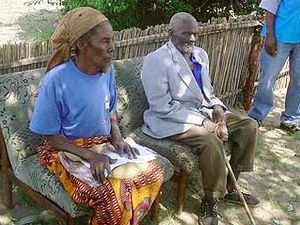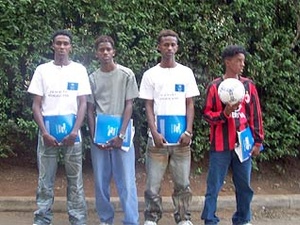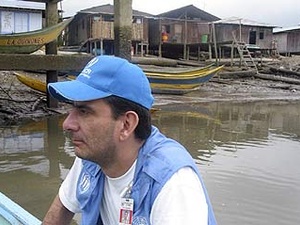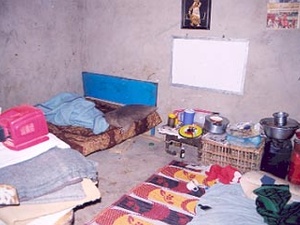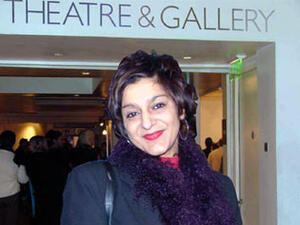Lost on the way home from Pakistan
Lost on the way home from Pakistan
A UNHCR worker comforts a displaced mother and her five-day-old daughter in a school village in Lebanon.
PESHAWAR, Pakistan (UNHCR) - For weeks, Abdul Sami has been a regular face at the iris-validation centre in Peshawar, Pakistan.
He is neither a UNHCR staff nor a "recycled" Afghan refugee hoping to obtain the refugee agency's repatriation assistance for a second time. Instead, he is an anxious father looking for his young son, last seen here in May this year.
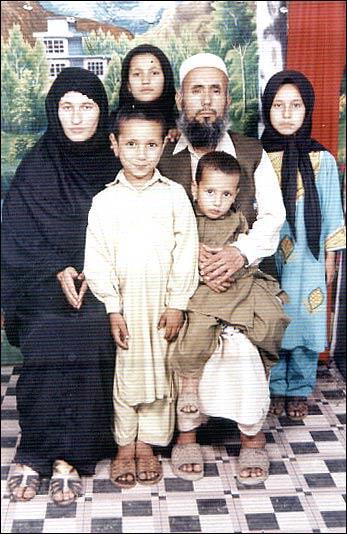
Abdul Basit (sitting on his father's lap) in a family portrait taken soon before he went missing.
As he jostles through the crowd waiting to undergo the last stage of verification before returning to Afghanistan, the warden shakes his head and laments that he has no news of the boy. Abdul Sami leaves, dejected.
What had started out as a happy day for the family turned into a tragic one when on May 6, three-year-old Abdul Basit disappeared at the Peshawar iris-validation centre where his family had gathered for their return to Afghanistan.
As everyone had their eyes photographed to ascertain that they were first-time returnees, no one kept an eye on the boy. When they discovered him missing, his desperate parents sought help from UNHCR staff, the police and locals in the area, but no one could find him.
"Someone has stolen my baby as he was very beautiful," cried Abdul Sami.
Time was running out. The repatriating group of 40 Afghan families could not wait any longer. The truck had to leave as it had a long journey ahead, and Abdul Sami's family could not stay behind because they had packed all their belongings and had nowhere left to stay in Pakistan.
The best thing to do at the time was to continue with the journey and if new information about the boy was found, it would be wired to Afghanistan.
The family went home to Kunduz province in northern Afghanistan, but their hearts were still adrift in Pakistan, where they had spent years in exile in the northern province of Punjab. Abdul Sami left them at home and turned back to look for his lost treasure.
After spending weeks in Peshawar, he became broke and indebted. "At first I stayed with people I knew, then I rented a room. I had to commute to different places too, including several trips to the iris-validation centre where I lost the apple of my eye."
He added, looking a little embarrassed, "I spent a lot of money visiting fortune-tellers. They told me that I am going to find him soon. Maybe after a week or so."
As he talked of his lost boy, Abdul Sami could not stop crying and a few drops wet his grey beard. He bowed his head and his whole body was shaking, partly because he had skipped three meals without even knowing it. Eventually he ate a little, just to pacify everyone so that they would help him.
Heartbroken, he conceded that he should go home soon instead of sacrificing the future of his other children for one child. Besides, the longer he stays in Peshawar, the deeper his debt, which may prevent him from returning altogether. But he said that his wife, Nafisa, would be waiting at the gate and would not allow him to go in without his son.
"Nafisa has lost her mental balance," he said, adding that he did not know how to explain to his wife why big organisations like UNHCR and the police cannot find a lost child.
But with the prevalence of crime syndicates that deliberately handicap children and throw them into the streets to beg for money, the chances of finding a toddler who cannot even speak properly seem slim.
UNHCR staff in both Pakistan and Afghanistan have been trying their best to help, putting up posters of the lost boy, taking up advertisements in newspapers and the radio in different languages.
As of today, there is still no news of Abdul Basit, and there is no guarantee there ever will be. His devastated mother must still be standing at the threshold of the door in Kunduz, waiting to hear about her lost treasure.
"I wish I can see his dead body," said his weary father. "My heart will be more satisfied."
By Mariam Arzomand
UNHCR Pakistan



